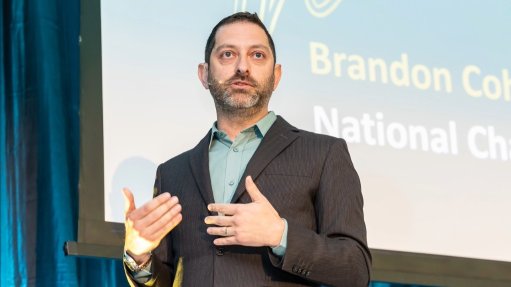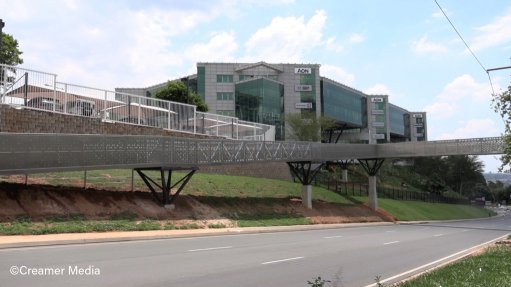South Africa becoming a viable international arbitration destination – law firm
Law firm Pinsent Masons finds there is increasing interest in South Africa as a viable option for international arbitration.
In the dynamic landscape of global commerce, the role of arbitration cannot be overstated, said Pinsent legal director Emma Roberts.
Arbitration was playing a significant role in Africa’s journey towards more renewable energy and reducing reliance on fossil fuels, she added, emphasising that a robust arbitration framework could instil confidence among investors.
The importance of arbitration in resolving trade and commercial disputes, as well as the importance of a shared cost of practice within the arbitration space in Africa, was discussed at the Johannesburg Arbitration Week from April 9 to 11.
During the event, Roberts highlighted how a stable legal framework could help address uncertainties in regulations and encourage businesses to participate in initiatives that support a greener future for Africa.
Pinsent environmental and energy lawyer Margo-Ann Werner spoke about the complexities of managing commercial and political risks that were prevalent on the continent. “The challenges that mining projects often encounter range from geopolitical tensions to regulatory complexities. Through arbitration, these challenges can be effectively managed to ensure the protection of investments and the fair resolution of disputes.”
MORE BENEFITS
Arbitration offers parties a way in which to ensure subject matter experts are appointed as decision-makers and it is also confidential. Local court systems are often not seen as efficient or predictable enough to resolve technically complex claims, where arbitration offers security, particularly where the host State is a signatory to the New York Convention.
“We are seeing more policy, regulation and solid legal frameworks flowing into African energy disputes, power purchase agreements and engineering, procurement and construction contracts,” Werner noted.
She pointed out more developers and investors were recognising the importance of governing law clauses and dispute resolution mechanisms in contracts. These established the foundation for resolving future disputes and were crucial for maintaining a clear framework in complex legal landscapes.
Other considerations for investors and developers include the ability to choose a neutral venue in arbitration proceedings to give both parties confidence in the fairness of the process, ensuring a level playing field.
It was essential to consider a jurisdiction that was impartial and had a well-established legal system, fostering trust and credibility, Roberts added.
Moreover, Pinsent said that striking a balance between expertise and cost was a consideration. Single arbitrators may be appropriate for straightforward disputes, whereas complex cases may require a panel of three arbitrators.
Investors also recognise the potential benefits of expert determination versus arbitration in specific situations. Expert determination can indeed offer advantages when swift resolution on technical or specialised issues is needed.
This alternative can be cost-effective and efficient, aligning with investors' interests in resolving specific matters promptly.
The recognition by investors of the binding and final determination provided by arbitration is significant. The limited grounds for appeal help uphold the integrity and efficiency of the arbitration process, but more importantly this characteristic of arbitration ensures certainty and allows investors to move forward with their business interests confidently.
IDEAL DESTINATION
Elaborating on the insights garnered from the arbitration week event, Roberts said it was evident that arbitration went beyond borders, serving as a cornerstone of international commerce.
For example, the implementation of the African Continental Free Trade Area Agreement, brings the expectation of increased cross-border trade and investments in Africa, which undoubtedly will lead to an increase in commercial disputes and international arbitration.
South Africa's strategic location at the crossroads of Africa’s trade routes and its status as one of the continent's leading economies make it an attractive destination for arbitration.
This advantageous position not only facilitated access for parties involved in disputes but also underscored South Africa's importance as a hub for international business transactions, Roberts said.
Moreover, the country’s legal community boasts a wealth of expertise in arbitration, with many practitioners and arbitrators recognised globally for their proficiency in the field.
This depth of knowledge and experience contributes to the credibility and effectiveness of arbitration proceedings conducted in the country.
Additionally, South Africa is home to several prominent arbitration institutions, such as the Arbitration Foundation of Southern Africa and the Association of Arbitrators. These institutions play a vital role in promoting excellence and professionalism in arbitration, providing essential support and resources for arbitration proceedings to ensure their smooth and efficient conduct.
South Africa's commitment to promoting diversity and inclusivity in arbitration is another factor contributing to its prominence on the international stage.
The country’s arbitration community actively promotes the participation of women, young practitioners, and individuals from diverse backgrounds.
This commitment to diversity ensures that arbitration panels reflect the rich tapestry of society and bring a wide range of perspectives to the table, fostering fairness, transparency, and legitimacy in the arbitration process.
“By embracing diversity, South Africa reinforces its reputation as a progressive and inclusive destination for arbitration, further enhancing its standing in the global arbitration community,” Roberts concluded.
Article Enquiry
Email Article
Save Article
Feedback
To advertise email advertising@creamermedia.co.za or click here
Comments
Announcements
What's On
Subscribe to improve your user experience...
Option 1 (equivalent of R125 a month):
Receive a weekly copy of Creamer Media's Engineering News & Mining Weekly magazine
(print copy for those in South Africa and e-magazine for those outside of South Africa)
Receive daily email newsletters
Access to full search results
Access archive of magazine back copies
Access to Projects in Progress
Access to ONE Research Report of your choice in PDF format
Option 2 (equivalent of R375 a month):
All benefits from Option 1
PLUS
Access to Creamer Media's Research Channel Africa for ALL Research Reports, in PDF format, on various industrial and mining sectors
including Electricity; Water; Energy Transition; Hydrogen; Roads, Rail and Ports; Coal; Gold; Platinum; Battery Metals; etc.
Already a subscriber?
Forgotten your password?
Receive weekly copy of Creamer Media's Engineering News & Mining Weekly magazine (print copy for those in South Africa and e-magazine for those outside of South Africa)
➕
Recieve daily email newsletters
➕
Access to full search results
➕
Access archive of magazine back copies
➕
Access to Projects in Progress
➕
Access to ONE Research Report of your choice in PDF format
RESEARCH CHANNEL AFRICA
R4500 (equivalent of R375 a month)
SUBSCRIBEAll benefits from Option 1
➕
Access to Creamer Media's Research Channel Africa for ALL Research Reports on various industrial and mining sectors, in PDF format, including on:
Electricity
➕
Water
➕
Energy Transition
➕
Hydrogen
➕
Roads, Rail and Ports
➕
Coal
➕
Gold
➕
Platinum
➕
Battery Metals
➕
etc.
Receive all benefits from Option 1 or Option 2 delivered to numerous people at your company
➕
Multiple User names and Passwords for simultaneous log-ins
➕
Intranet integration access to all in your organisation














